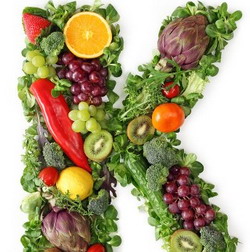Women Healthy -

Vitamin K has many benefits for our bodies. Benefits of vitamin K is for blood clotting. Lack of vitamin K lead bleeding endlessly, and severe anemia. Vitamin K controls the production of prothrombin in the liver. Vitamin K is produced in the gut and fat-soluble vitamins. Vitamin K helps the absorption of calcium from food, thus helping the formation and maintenance of bone health.

Vitamin K may be a future alternative to handle some types of cancer. Because vitamin K acts as a poison to cancer cells, but not membahayaklan healthy cells. Vitamin K also acts to prevent Alzheimer's disease and to help control blood sugar levels so that did not happen diabetes.
Vitamin K is a fat-soluble vitamin. Vitamin K is itself divided into three kinds, from generating sources, such as:
- Vitamin K1 (phylloquinone): This vitamin is produced by plants.
- Vitamin K2 (menaquinone): This vitamin is a result of the bacteria found in the digestive organs of the colon.
- Vitamin K3 (menadione): This vitamin is a vitamin-made to help someone who has problems with the digestive organs to absorb food.
Vitamin K Health Benefits
Blood clotting
Vitamin K prevents severe blood loss due to injury, by slowing and stopping the bleeding.
Prevent Osteoporosis
Vitamin K can make bones more healthy, in addition to calcium. Vitamin K can improve bone quality in our bodies. This vitamin also helps calcium and other minerals in bones for each binding.
Prevent Cancer
Vitamin K can also fight cancer cells in the body. Several studies have shown that people who consume the vitamin K in their diet are more resistant to cancer. Type of vitamin is even more effective in the fight against blood cancer and colon.
Preventing brain hemorrhage
Babies need an injection of vitamin K because it does not have sufficient levels in their bodies. Vitamins may prevent children from bleeding in the brain.
Menstruation
Vitamin K is essential for children who are experiencing menstrual cycle. When the body is deficient in vitamin K, you will lose a lot of blood during the menstrual period. It makes people feel weak physically.
Vitamin K Rich Foods
Vitamin K is found in various foods including green leafy vegetables, meats, and dairy products. Vitamin K can also be derived from the bacteria in the gut which synthesize vitamin K which is then absorbed and stored in the liver. There are some vegetables and fruits rich in vitamin K, which are:
- Mustard greens. The content of vitamin K in the green mustard quite high compared to other vegetables are 419.3 mcg per one cup. You just eat greens mustard every day as much as one-off, then the need for vitamin K you will be met on a daily basis without having to take more supplements vitamin K. Therefore, mustard greens being the best source of vitamin K which is highly recommended.
- Asparagus. The content of vitamin K in 100 grams of asparagus is 416 mcg. The content of vitamin K, which is quite high as well on the type of vegetables can be used as an alternative when bored eating mustard.
- Kiwi. The content of vitamin K in kiwifruit at 100 grams is 40.3 mcg, or the equivalent of 10% of the daily vitamin K your body needs.
- Grapes. Vitamin K in the grape with a dose of 100 grams is equivalent to 22 mcg or 21% of vitamin K per day. The grapes are helpful to increase blood flow into the heart.
- Lettuce. To dose of 100 grams of lettuce, containing a total of 128 mcg of vitamin K.
- Spinach. The content of vitamin K in green or red spinach is 89 mcg in 100 gr.
Vitamin K Recommended Daily Intake
By the standards of RDA (Recommended Dietary Allowance) of vitamin K a person needs depends on his weight. For adults, it requires at least 1 microgram per day per kg of body weight. So, if you weigh 50 kg then it needs to reach 50 micrograms per day.
Vitamin K deficiency
If vitamin K is not contained in the body, blood can not clot. This can cause bleeding or hemorrhagic. However, vitamin K deficiency is rare because most people get it from bacteria in the gut and from food. However, deficiency can occur in infants because their digestive systems are sterile and do not contain bacteria that can synthesize vitamin K, breast milk contains only small amounts of vitamin K. For that, the baby was given a vitamin K at birth.
In adults, deficiency can occur due to lack of consumption of vegetables or eating antobiotik too long. Antibiotics can kill beneficial bacteria in the intestines that produce vitamin K. Sometimes vitamin K deficiency caused by liver disease or digestive problems.
Poisoned of Vitamin K
You can also poisoned vitamin K. It occurs only in people receiving vitamin K replacement water soluble. The symptoms are hemolysis (destruction of red blood cells), jaundice and brain damage.









